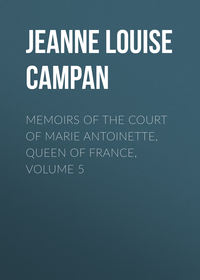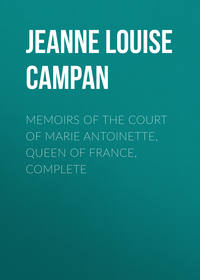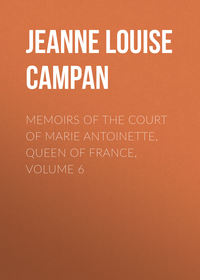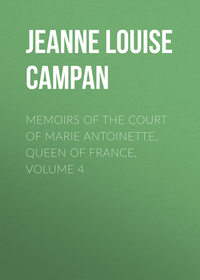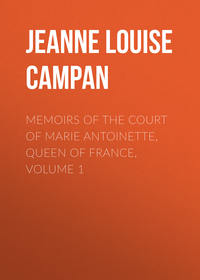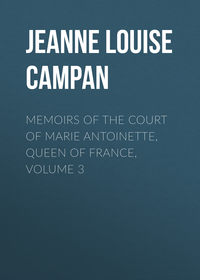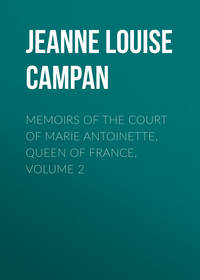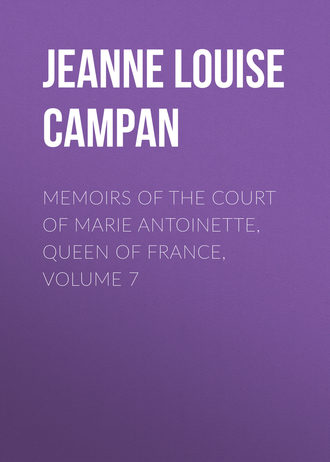 полная версия
полная версияMemoirs of the Court of Marie Antoinette, Queen of France, Volume 7
The Royal Prisoners.—Separation of the Dauphin from His Family.
–Removal of the Queen.
On the morning of the King's execution, according to the narrative of Madame Royale, his family rose at six: "The night before, my mother had scarcely strength enough to put my brother to bed; She threw herself, dressed as she was, on her own bed, where we heard her shivering with cold and grief all night long. At a quarter-past six the door opened; we believed that we were sent for to the King, but it was only the officers looking for a prayer-book for him. We did not, however, abandon the hope of seeing him, till shouts of joy from the infuriated populace told us that all was over. In the afternoon my mother asked to see Clery, who probably had some message for her; we hoped that seeing him would occasion a burst of grief which might relieve the state of silent and choking agony in which we saw her." The request was refused, and the officers who brought the refusal said Clery was in "a frightful state of despair" at not being allowed to see the royal family; shortly afterwards he was dismissed from the Temple.
"We had now a little more freedom," continues the Princess; "our guards even believed that we were about to be sent out of France; but nothing could calm my mother's agony; no hope could touch her heart, and life or death became indifferent to her. Fortunately my own affliction increased my illness so seriously that it distracted her thoughts . . . . My mother would go no more to the garden, because she must have passed the door of what had been my father's room, and that she could not bear. But fearing lest want of air should prove injurious to my brother and me, about the end of February she asked permission to walk on the leads of the Tower, and it was granted."
The Council of the Commune, becoming aware of the interest which these sad promenades excited, and the sympathy with which they were observed from the neighbouring houses, ordered that the spaces between the battlements should be filled up with shutters, which intercepted the view. But while the rules for the Queen's captivity were again made more strict, some of the municipal commissioners tried slightly to alleviate it, and by means of M. de Hue, who was at liberty in Paris, and the faithful Turgi, who remained in the Tower, some communications passed between the royal family and their friends. The wife of Tison, who waited on the Queen, suspected and finally denounced these more lenient guardians,—[Toulan, Lepitre, Vincent, Bruno, and others.]—who were executed, the royal prisoners being subjected to a close examination.
"On the 20th of April," says Madame Royale, "my mother and I had just gone to bed when Hebert arrived with several municipals. We got up hastily, and these men read us a decree of the Commune directing that we should be searched. My poor brother was asleep; they tore him from his bed under the pretext of examining it. My mother took him up, shivering with cold. All they took was a shopkeeper's card which my mother had happened to keep, a stick of sealing-wax from my aunt, and from me 'une sacre coeur de Jesus' and a prayer for the welfare of France. The search lasted from half-past ten at night till four o'clock in the morning."
The next visit of the officials was to Madame Elisabeth alone; they found in her room a hat which the King had worn during his imprisonment, and which she had begged him to give her as a souvenir. They took it from her in spite of her entreaties. "It was suspicious," said the cruel and contemptible tyrants.
The Dauphin became ill with fever, and it was long before his mother, who watched by him night and day, could obtain medicine or advice for him. When Thierry was at last allowed to see him his treatment relieved the most violent symptoms, but, says Madame Royale, "his health was never reestablished. Want of air and exercise did him great mischief, as well as the kind of life which this poor child led, who at eight years of age passed his days amidst the tears of his friends, and in constant anxiety and agony."
While the Dauphin's health was causing his family such alarm, they were deprived of the services of Tison's wife, who became ill, and finally insane, and was removed to the Hotel Dieu, where her ravings were reported to the Assembly and made the ground of accusations against the royal prisoners.
[This woman, troubled by remorse, lost her reason, threw herself at the feet of the Queen, implored her pardon, and disturbed the Temple for many days with the sight and the noise of her madness. The Princesses, forgetting the denunciations of this unfortunate being, in consideration of her repentance and insanity, watched over her by turns, and deprived themselves of their own food to relieve her.—LAMARTINE, "History of the Girondists," vol. iii., p.140.]
No woman took her place, and the Princesses themselves made their beds, swept their rooms, and waited upon the Queen.
Far worse punishments than menial work were prepared for them. On 3d July a decree of the Convention ordered that the Dauphin should be separated from his family and "placed in the most secure apartment of the Tower." As soon as he heard this decree pronounced, says his sister, "he threw himself into my mother's arms, and with violent cries entreated not to be parted from her. My mother would not let her son go, and she actually defended against the efforts of the officers the bed in which she had placed him. The men threatened to call up the guard and use violence. My mother exclaimed that they had better kill her than tear her child from her. At last they threatened our lives, and my mother's maternal tenderness forced her to the sacrifice. My aunt and I dressed the child, for my poor mother had no longer strength for anything. Nevertheless, when he was dressed, she took him up in her arms and delivered him herself to the officers, bathing him with her tears, foreseeing that she was never to behold him again. The poor little fellow embraced us all tenderly, and was carried away in a flood of tears. My mother's horror was extreme when she heard that Simon, a shoemaker by trade, whom she had seen as a municipal officer in the Temple, was the person to whom her child was confided . . . . The officers now no longer remained in my mother's apartment; they only came three times a day to bring our meals and examine the bolts and bars of our windows; we were locked up together night and day. We often went up to the Tower, because my brother went, too, from the other side. The only pleasure my mother enjoyed was seeing him through a crevice as he passed at a distance. She would watch for hours together to see him as he passed. It was her only hope, her only thought."
The Queen was soon deprived even of this melancholy consolation. On 1st August, 1793, it was resolved that she should be tried. Robespierre opposed the measure, but Barere roused into action that deep-rooted hatred of the Queen which not even the sacrifice of her life availed to eradicate. "Why do the enemies of the Republic still hope for success?" he asked. "Is it because we have too long forgotten the crimes of the Austrian? The children of Louis the Conspirator are hostages for the Republic . . .but behind them lurks a woman who has been the cause of all the disasters of France."
At two o'clock on the morning of the following day, the municipal officers "awoke us," says Madame Royale, "to read to my mother the decree of the Convention, which ordered her removal to the Conciergerie,
[The Conciergerie was originally, as its name implies, the porter's lodge of the ancient Palace of Justice, and became in time a prison, from the custom of confining there persons who had committed trifling offences about the Court.]
preparatory to her trial. She heard it without visible emotion, and without speaking a single word. My aunt and I immediately asked to be allowed to accompany my mother, but this favour was refused us. All the time my mother was making up a bundle of clothes to take with her, these officers never left her. She was even obliged to dress herself before them, and they asked for her pockets, taking away the trifles they contained. She embraced me, charging me to keep up my spirits and my courage, to take tender care of my aunt, and obey her as a second mother. She then threw herself into my aunt's arms, and recommended her children to her care; my aunt replied to her in a whisper, and she was then hurried away. In leaving the Temple she struck her head against the wicket, not having stooped low enough.
[Mathieu, the gaoler, used to say, "I make Madame Veto and her sister and daughter, proud though they are, salute me; for the door is so low they cannot pass without bowing."]
The officers asked whether she had hurt herself. 'No,' she replied, 'nothing can hurt me now."
The Last Moments of Marie Antoinette.
We have already seen what changes had been made in the Temple. Marie Antoinette had been separated from her sister, her daughter, and her Son, by virtue of a decree which ordered the trial and exile of the last members of the family of the Bourbons. She had been removed to the Conciergerie, and there, alone in a narrow prison, she was reduced to what was strictly necessary, like the other prisoners. The imprudence of a devoted friend had rendered her situation still more irksome. Michonnis, a member of the municipality, in whom she had excited a warm interest, was desirous of introducing to her a person who, he said, wished to see her out of curiosity. This man, a courageous emigrant, threw to her a carnation, in which was enclosed a slip of very fine paper with these words: "Your friends are ready,"—false hope, and equally dangerous for her who received it, and for him who gave it! Michonnis and the emigrant were detected and forthwith apprehended; and the vigilance exercised in regard to the unfortunate prisoner became from that day more rigorous than ever.
[The Queen was lodged in a room called the council chamber, which was considered as the moat unwholesome apartment in the Conciergerie on account of its dampness and the bad smells by which it was continually affected. Under pretence of giving her a person to wait upon her they placed near her a spy,—a man of a horrible countenance and hollow, sepulchral voice. This wretch, whose name was Barassin, was a robber and murderer by profession. Such was the chosen attendant on the Queen of France! A few days before her trial this wretch was removed and a gendarme placed in her chamber, who watched over her night and day, and from whom she was not separated, even when in bed, but by a ragged curtain. In this melancholy abode Marie Antoinette had no other dress than an old black gown, stockings with holes, which she was forced to mend every day; and she was entirely destitute of shoes.—DU BROCA.]
Gendarmes were to mount guard incessantly at the door of her prison, and they were expressly forbidden to answer anything that she might say to them.
That wretch Hebert, the deputy of Chaumette, and editor of the disgusting paper Pere Duchesne, a writer of the party of which Vincent, Ronsin, Varlet, and Leclerc were the leaders—Hebert had made it his particular business to torment the unfortunate remnant of the dethroned family. He asserted that the family of the tyrant ought not to be better treated than any sans-culotte family; and he had caused a resolution to be passed by which the sort of luxury in which the prisoners in the Temple were maintained was to be suppressed. They were no longer to be allowed either poultry or pastry; they were reduced to one sort of aliment for breakfast, and to soup or broth and a single dish for dinner, to two dishes for supper, and half a bottle of wine apiece. Tallow candles were to be furnished instead of wag, pewter instead of silver plate, and delft ware instead of porcelain. The wood and water carriers alone were permitted to enter their room, and that only accompanied by two commissioners. Their food was to be introduced to them by means of a turning box. The numerous establishment was reduced to a cook and an assistant, two men-servants, and a woman-servant to attend to the linen.
As soon as this resolution was passed, Hebert had repaired to the Temple and inhumanly taken away from the unfortunate prisoners even the most trifling articles to which they attached a high value. Eighty Louis which Madame Elisabeth had in reserve, and which she had received from Madame de Lamballe, were also taken away. No one is more dangerous, more cruel, than the man without acquirements, without education, clothed with a recent authority. If, above all, he possess a base nature, if, like Hebert, who was check-taker at the door of a theatre, and embezzled money out of the receipts, he be destitute of natural morality, and if he leap all at once from the mud of his condition into power, he is as mean as he is atrocious. Such was Hebert in his conduct at the Temple. He did not confine himself to the annoyances which we have mentioned. He and some others conceived the idea of separating the young Prince from his aunt and sister. A shoemaker named Simon and his wife were the instructors to whom it was deemed right to consign him for the purpose of giving him a sans-cullotte education. Simon and his wife were shut up in the Temple, and, becoming prisoners with the unfortunate child, were directed to bring him up in their own way. Their food was better than that of the Princesses, and they shared the table of the municipal commissioners who were on duty. Simon was permitted to go down, accompanied by two commissioners, to the court of the Temple, for the purpose of giving the Dauphin a little exercise.
Hebert conceived the infamous idea of wringing from this boy revelations to criminate his unhappy mother. Whether this wretch imputed to the child false revelations, or abused his, tender age and his condition to extort from him what admissions soever he pleased, he obtained a revolting deposition; and as the youth of the Prince did not admit of his being brought before the tribunal, Hebert appeared and detailed the infamous particulars which he had himself either dictated or invented.
It was on the 14th of October that Marie Antoinette appeared before her judges. Dragged before the sanguinary tribunal by inexorable revolutionary vengeance, she appeared there without any chance of acquittal, for it was not to obtain her acquittal that the Jacobins had brought her before it. It was necessary, however, to make some charges. Fouquier therefore collected the rumours current among the populace ever since the arrival of the Princess in France, and, in the act of accusation, he charged her with having plundered the exchequer, first for her pleasures, and afterwards in order to transmit money to her brother, the Emperor. He insisted on the scenes of the 5th and 6th of October, and on the dinners of the Life Guards, alleging that she had at that period framed a plot, which obliged the people to go to Versailles to frustrate it. He afterwards accused her of having governed her husband, interfered in the choice of ministers, conducted the intrigues with the deputies gained by the Court, prepared the journey to Varennes, provoked the war, and transmitted to the enemy's generals all our plans of campaign. He further accused her of having prepared a new conspiracy on the 10th of August, of having on that day caused the people to be fired upon, having induced her husband to defend himself by taxing him with cowardice; lastly, of having never ceased to plot and correspond with foreigners since her captivity in the Temple, and of having there treated her young son as King. We here observe how, on the terrible day of long-deferred vengeance, when subjects at length break forth and strike such of their princes as have not deserved the blow, everything is distorted and converted into crime. We see how the profusion and fondness for pleasure, so natural to a young princess, how her attachment to her native country, her influence over her husband, her regrets, always more indiscreet in a woman than a man, nay, even her bolder courage, appeared to their inflamed or malignant imaginations.
It was necessary to produce witnesses. Lecointre, deputy of Versailles, who had seen what had passed on the 5th and 6th of October, Hebert, who had frequently visited the Temple, various clerks in the ministerial offices, and several domestic servants of the old Court were summoned.. Admiral d'Estaing, formerly commandant of the guard of Versailles; Manuel, the ex-procureur of the Commune; Latour-du-Pin, minister of war in 1789; the venerable Bailly, who, it was said, had been, with La Fayette, an accomplice in the journey to Varennes; lastly, Valaze one of the Girondists destined to the scaffold, were taken from their prisons and compelled to give evidence.
No precise fact was elicited. Some had seen the Queen in high spirits when the Life Guards testified their attachment; others had seen her vexed and dejected while being conducted to Paris, or brought back from Varennes; these had been present at splendid festivities which must have cost enormous sums; those had heard it said in the ministerial offices that the Queen was adverse to the sanction of the decrees. An ancient waiting-woman of the Queen had heard the Duc de Coigny say, in 1788, that the Emperor had already received two hundred millions from France to make war upon the Turks.
The cynical Hebert, being brought before the unfortunate Queen, dared at length to prefer the charges wrung from the young Prince. He said that Charles Capet had given Simon an account of the journey to Varennes, and mentioned La Fayette and Bailly as having cooperated in it. He then added that this boy was addicted to odious and very premature vices for his age; that he had been surprised by Simon, who, on questioning him, learned that he derived from his mother the vices in which he indulged. Hebert said that it was no doubt the intention of Marie Antoinette, by weakening thus, early the physical constitution of her son, to secure to herself the means of ruling him in case he should ever ascend the throne. The rumours which had been whispered for twenty years by a malicious Court had given the people a most unfavourable opinion of the morals of the Queen. That audience, however, though wholly Jacobin, was disgusted at the accusations of Hebert.
[Can there be a more infernal invention than that made against the. Queen by Hdbert,—namely, that she had had an improper intimacy with her own son? He made use of this sublime idea of which he boasted in order to prejudice the women against the Queen, and to prevent her execution from exciting pity. It had, however, no other effect than that of disgusting all parties.—PRUDHOMME.]
He nevertheless persisted in supporting them.
[Hebert did not long survive her in whose sufferings he had taken such an infamous part. He was executed on 26th March, 1794.]
The unhappy mother made no reply. Urged a new to explain herself, she said, with extraordinary emotion, "I thought that human nature would excuse me from answering such an imputation, but I appeal from it to the heart of every mother here present." This noble and simple reply affected all who heard it.
In the depositions of the witnesses, however, all was not so bitter for Marie Antoinette. The brave D'Estaing, whose enemy she had been, would not say anything to inculpate her, and spoke only of the courage which she had shown on the 5th and 6th of October, and of the noble resolution which she had expressed, to die beside her husband rather than fly. Manuel, in spite of his enmity to the Court during the time of the Legislative Assembly, declared that he could not say anything against the accused. When the venerable Bailly was brought forward, who formerly so often predicted to the Court the calamities which its imprudence must produce, he appeared painfully affected; and when he was asked if he knew the wife of Capet, "Yes," said he, bowing respectfully, "I have known Madame." He declared that he knew nothing, and maintained that the declarations extorted from the young Prince relative to the journey to Varennes were false. In recompense for his deposition he was assailed with outrageous reproaches, from which he might judge what fate would soon be awarded to himself.
In all the evidence there appeared but two serious facts, attested by Latour-du-Pin and Valaze, who deposed to them because they could not help it. Latour-du-Pin declared that Marie Antoinette had applied to him for an accurate statement of the armies while he was minister of war. Valaze, always cold, but respectful towards misfortune, would not say anything to criminate the accused; yet he could not help declaring that, as a member of the commission of twenty-four, being charged with his colleagues to examine the papers found at the house of Septeuil, treasurer of the civil list, he had seen bonds for various sums signed Antoinette, which was very natural; but he added that he had also seen a letter in which the minister requested the King to transmit to the Queen the copy of the plan of campaign which he had in his hands. The most unfavourable construction was immediately put upon these two facts, the application for a statement of the armies, and the communication of the plan of campaign; and it was concluded that they could not be wanted for any other purpose than to be sent to the enemy, for it was not supposed that a young princess should turn her attention, merely for her own satisfaction, to matters of administration and military, plans. After these depositions, several others were received respecting the expenses of the Court, the influence of the Queen in public affairs, the scene of the 10th of August, and what had passed in the Temple; and the most vague rumours and most trivial circumstances were eagerly caught at as proofs.
Marie Antoinette frequently repeated, with presence of mind and firmness, that there was no precise fact against her;
[At first the Queen, consulting only her own sense of dignity, had resolved on her trial to make no other reply to the questions of her judges than "Assassinate me as you have already assassinated my husband!" Afterwards, however, she determined to follow the example of the King, exert herself in her defence, and leave her judges without any excuse or pretest for putting her to death.—WEBER'S "Memoirs of Marie Antoinette."]
that, besides, though the wife of Louis XVI., she was not answerable for any of the acts of his reign. Fouquier nevertheless declared her to be sufficiently convicted; Chaveau-Lagarde made unavailing efforts to defend her; and the unfortunate Queen was condemned to suffer the same fate as her husband.
Conveyed back to the Conciergerie, she there passed in tolerable composure the night preceding her execution, and, on the morning of the following day, the 16th of October,
[The Queen, after having written and prayed, slept soundly for some hours. On her waking, Bault's daughter dressed her and adjusted her hair with more neatness than on other days. Marie Antoinette wore a white gown, a white handkerchief covered her shoulders, a white cap her hair; a black ribbon bound this cap round her temples …. The cries, the looks, the laughter, the jests of the people overwhelmed her with humiliation; her colour, changing continually from purple to paleness, betrayed her agitation …. On reaching the scaffold she inadvertently trod on the executioner's foot. "Pardon me," she said, courteously. She knelt for an instant and uttered a half-audible prayer; then rising and glancing towards the towers of the Temple, "Adieu, once again, my children," she said; "I go to rejoin your father."—LAMARTINE.]
she was conducted, amidst a great concourse of the populace, to the fatal spot where, ten months before, Louis XVI. had perished. She listened with calmness to the exhortations of the ecclesiastic who accompanied her, and cast an indifferent look at the people who had so often applauded her beauty and her grace, and who now as warmly applauded her execution. On reaching the foot of the scaffold she perceived the Tuileries, and appeared to be moved; but she hastened to ascend the fatal ladder, and gave herself up with courage to the executioner.
[Sorrow had blanched the Queen's once beautiful hair; but her features and air still commanded the admiration of all who beheld her; her cheeks, pale and emaciated, were occasionally tinged with a vivid colour at the mention of those she had lost. When led out to execution, she was dressed in white; she had cut off her hair with her own hands. Placed in a tumbrel, with her arms tied behind her, she was taken by a circuitous route to the Place de la Revolution, and she ascended the scaffold with a firm and dignified step, as if she had been about to take her place on a throne by the side of her husband.-LACRETELLE.]


